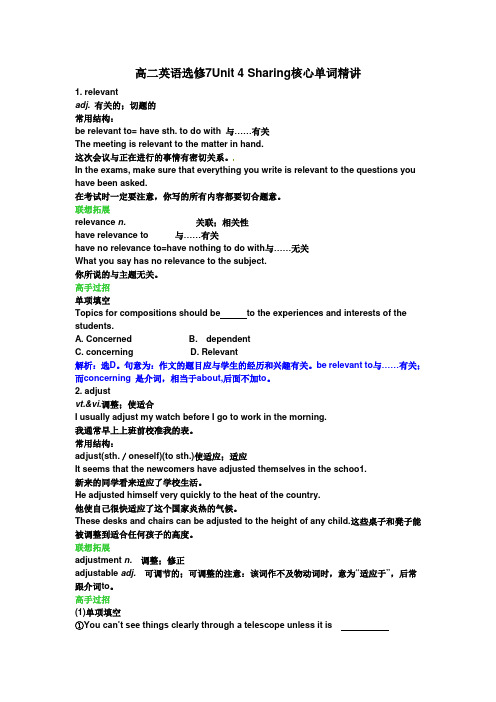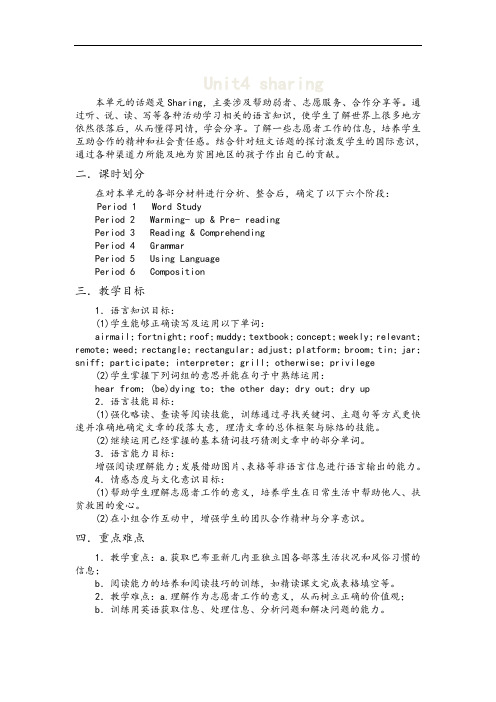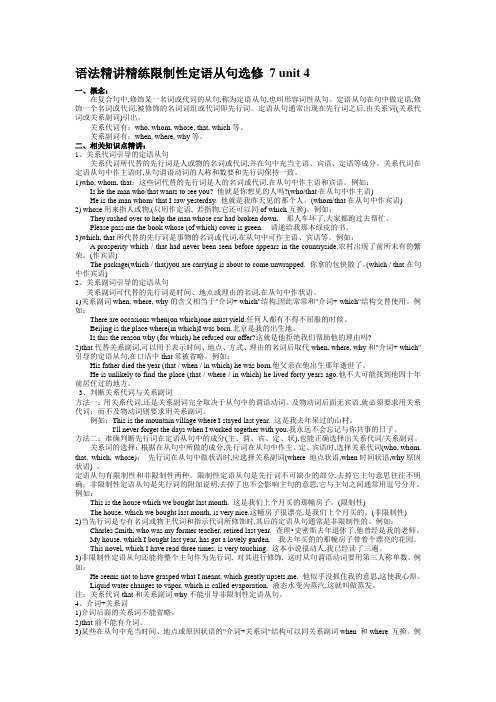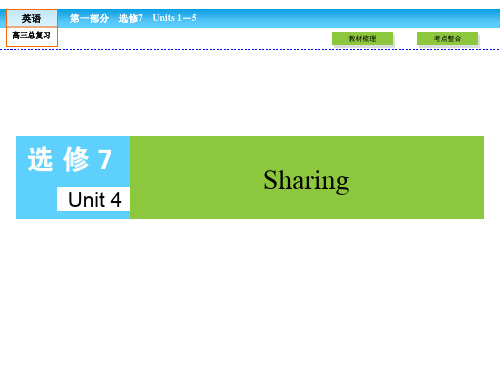选修7 Unit4 period 4
英语选修7unit4Reading

Mukap
Kiak
Kiak
Divide it into four parts, and summarize what each part is about.
Opening of the letter and introduction to what will be talked about in the passage.
C
B
A
人教课标
高二 选修7
Unit 4
Unit 4 Sharing
Reading
Warming up
Volunteer
The definition of Volunteer
People who help others in their community or outside their community would be called volunteers. However, they would not be called volunteers if they help their parents, other relatives or frienind of student was in Jo’s class?
Look at the photos and answer the questions.
Secondary school children from a
developing country. We know this because there are no walls to the classroom so the climate must be hot. The desks are close together but there does not appear to be enough desks for each child. The students are poorly dressed.
高二英语选修7Unit 4 Sharing核心单词精讲

高二英语选修7Unit 4 Sharing核心单词精讲1. relevantadj.有关的;切题的常用结构:be relevant to= have sth. to do with 与……有关The meeting is relevant to the matter in hand.这次会议与正在进行的事情有密切关系。
In the exams, make sure that everything you write is relevant to the questions you have been asked.在考试时一定要注意,你写的所有内容都要切合题意。
联想拓展relevance n.关联;相关性have relevance to 与……有关have no relevance to=have nothing to do with与……无关What you say has no relevance to the subject.你所说的与主题无关。
高手过招单项填空Topics for compositions should be to the experiences and interests of the students.A. ConcernedB. dependentC. concerningD. Relevant解析:选D。
句意为:作文的题目应与学生的经历和兴趣有关。
be relevant to与……有关;而concerning 是介词,相当于about,后面不加to。
2. adjustvt.&vi.调整;使适合I usually adjust my watch before I go to work in the morning.我通常早上上班前校准我的表。
常用结构:adjust(sth./oneself)(to sth.)使适应;适应It seems that the newcomers have adjusted themselves in the schoo1.新来的同学看来适应了学校生活。
高中英语选修七unit4PPT课件

gradually.
A. is drying up
B. will be drying up
C. had dried up
D. are drying up
【解析】选A。考查动词的时态和主谓一致。用现在进行时,
表示河流的干涸正在发生。该句主语是the river, 故谓语动词
用单数形式。
.
11
7. otherwise conj. 否则; 不然 adv. 用别的方法; 其他方面
1. hear from收到……的信 【归纳拓展】
hear about/of
听说; 得知
hear sb. out 【名师点津】
听某人把话说完
hear from其意虽然表示“收到某人的来信、电话、信息”
等, 但from后并不接letter, call, information之类的词, 而接表
示人或机构的词汇。
.
16
【思维延伸】otherwise何时为虚拟语气的标志 otherwise引导的句子如果表示与事实相反, 则用虚拟语气。
①Seize the chance, __o_t_h_e_r_w_i_se__y_o_u_w__il_l_r_e_g_re_t_.it(完成句子) 抓住这个机会, 否则你会后悔。 ②You should be more careful, otherwise you might meet with some accidents. (翻译句子) __你__应__该__更__加__小__心__, _要__不__然__你__会__出__事__的__。_
2. 极想;渴望
___________________
3. 不久前的一天
___________________
人教版选修7Unit4Sharing重点短语句型及语法

人教版选修7Unit4Sharing重点短语句型及语法Book7 Unit 4必背句型1:1.It takes me only a few minutes to walk to school down a muddy track. (It takes sb. sth. to do…)相似句:The hut was dark inside so it took time for our eyes to adjust. 眼睛需要时间来调整适应。
2.The other day I was showing the boys the weekly chemistry experiment when, before I knew it, themixture was bubbling over everywhere!(was/were doing…when…正在做…突然…;before还没来得及) 仿写:They were shopping when the hotel opposite the street fell down.他们正逛街突然对面酒店倒塌了。
The ruins fell onto them before they could fled from the spot.他们还没来得及跑出现场,废墟就砸他们身上了。
3.There was a newly made platform (for Jenny and me)to sleep on.新做了一个平台,是让我和珍妮睡觉用的。
(to sleep on作定语,与所修饰的platform有动宾关系,不能省略on, 不定式前有for sb, 可知是主动的)必背短语1:1.work as 充当;担任;担任…的工作→近义短语:serve as/ act as2.take photos of / take a photo of 给…拍照3.hear from 收到…的来信hear about 听到;得知;了解4.be dying to do渴望做;极想做→be eager/desperate/thirsty/greedy to do→long/desire to do →have a strong desire to dobe dying/eager/desperate/thirsty/greedy for sth. →long for→have a strong for 极想/渴望得到…5.be made of/from由…制成be made up of由…组成be made in在…制造6.up to 多达;直到;胜任;由…负责7.adapt to 适应→adjust to →make an adjustment to (作出调整以)适应adapt oneself to (使自己)适应= adjust oneself to (调整自己以)适应8.for sure 确定的(地);确切的(地)9.the other day 不久前的一天(典型的一般过去时的时间状语)/doc/692682126.html,e across (偶然)遇见;(偶然)碰到→run into11.be relevant to 与…相关;与…密切相关12.make a difference (to…)对…有影响;有所作为13.shake hands with 和…握手14.get through 通过;度过;完成;接通(电话等)15.participate in→take part in /join in16.dry out (指浸水等之物)变干;干透(become empty of water; to become completely dry)dry up (指河流、井、食物等)干涸(to become completely dry; to come to an end)dry off (使) 变干;使干透,弄干(to become dry on the surface) 课文词块翻译1:1.have no concept of doing experiments 没有做实验的概念2.to be honest 老实说;说实话3.build a fire 生火4.covered the vegetables with banana leaves 用香蕉叶盖住蔬菜5.with grass sticking out of the roof 茅草伸出屋顶必背句型2:1.The gift you give is not something your loved one keeps but a voluntary contribution towards thelives of people who really need it.(not…but…并列连词,连接并列的结构,连接并列主语时,谓语动词与就近的主语保持一致;此句中含有三个定语从句)仿写:Such is life. The one who I loved didn’t love me while I didn’t love the one who loved me.人生如此奇妙。
【高中英语教材知识梳理】选修七 Unit 4

Unit 4SharingⅠ.单词语境记忆1.relevant to your suggestion与你的建议相关2.enjoy a privilege享受特权3.in that remote area 在那个遥远的地方4.the weekly-published magazine 每周出版的杂志5.built a platform in the tree 在树上搭建平台6.the broom behind the door 门后的扫帚7.regret purchasing such a big house 后悔买如此大的房子8.live in security and lead a happy life 生活平安幸福9.dream of becoming an astronaut梦想成为宇航员10.celebrate their wedding anniversary庆祝他们的结婚周年纪念日Ⅱ.词性转换与派生记忆1.weed n.杂草;野草→v t.& v i.除杂草2.grill n.烤架;大平底锅→v t.烧烤;炙烤3.toast n.烤面包(片);吐司面包;干杯→v t.烤(面包等);敬酒4.comb n.梳子→v i.梳(发)5.click n.咔嗒声→v i.& v t.(使)发出咔嗒声6.tailor n.裁缝→v t.剪裁;缝制(衣服)7.adjust v i.& v t.调整;(使)适合→adjustable adj.可调整的→adjustment n.调整;调节;适应8.participate v i.参与;参加→participation n.参加;参与→participant n.参与者;参加者9.arrangement n.安排;排列;整理→arrange v.安排;排列;整理10.donate v t.捐赠→donation n.捐赠→donator n.捐赠者11.voluntary adj.自愿的;志愿的;无偿的→volunteer n.自愿者;志愿者v i.自愿做12.political adj.政治的;政党的→politics n.政治13.distribute v t.分配;分发→distribution n.分配;分发;分布状态14.security n.安全;保护;保障→secure v t.使安全adj.安全的15.operate v i.工作;运转;动手术v t.操作→operation n.手术;运转;操作→operator n.操作人员Ⅲ.单词趣味串记1.Believe it or not,there is some difference between an interpreter and translator.信不信由你,口译者和翻译家有些不同。
人教新课标英语选修7unit4

人教新课标英语选修7unit4人教新课标英语选修7的第四单元通常围绕一个特定的主题展开,包括词汇、语法、阅读、听力、口语和写作等部分。
以下是一个可能的单元内容概述:词汇(Vocabulary)- 学习与主题相关的新词汇,例如:environment, conservation, endangered, habitat, species, ecosystem等。
- 通过例句和上下文来理解这些词汇的用法。
语法(Grammar)- 复习或学习新的语法点,例如:被动语态、条件句、定语从句等。
- 通过练习题来加强语法知识的掌握。
阅读理解(Reading Comprehension)- 阅读一篇或多篇与主题相关的文章,例如关于环境保护、濒危物种保护等。
- 完成阅读理解题,包括细节理解、主旨大意、推理判断等。
听力(Listening)- 听一段或几段与主题相关的听力材料,可能是访谈、讲座或新闻报道。
- 完成听力理解题,包括选择题、填空题或简答题。
口语(Speaking)- 参与讨论或角色扮演,与同学们交流关于环境保护的看法和建议。
- 练习使用新学的词汇和语法结构进行流利的口语表达。
写作(Writing)- 写一篇与主题相关的短文或报告,例如关于本地环境保护的倡议书或研究报告。
- 练习组织文章结构,使用恰当的连接词,以及准确地运用新学的词汇和语法。
文化角(Cultural Corner)- 了解与主题相关的文化背景知识,例如不同国家或地区在环境保护方面的实践和经验。
- 讨论文化差异对环境保护观念和实践的影响。
复习与测试(Review and Test)- 通过复习本单元所学内容,巩固知识点。
- 完成单元测试,检验学习效果。
请注意,以上内容仅为示例,实际的单元内容可能会有所不同,具体取决于教材的编排和教师的教学计划。
选修7 Unit 4

高考总复习.人教版.英语
• ◆学以致用 学以致用 • 完成下列句子。 • 1.这类大学课程与当今问题的关系已不再有实际价值。 • This type of university course is_____________ • today’s problem. • 2.我必须学会适应英国的生活。 • I must learn to_____________English life. • 3.在现代社会,受教育不应该被看成是一种特权。 • Education should not________in the modern society. • 4.我要设法与他达成某种协议。 • I’ll_____________some sort of_____________him.
高考总复习.人教版.英语
• • • • • • • • • • • •
5.我给你打了几次电话,可是没打通。 __________________________________ 6.我能与你共用你的电脑吗? __________________________________ 7.这幅画明天的这个时候应该干了。 __________________________________ 8.患难见真情。 __________________________________ 9.他努力使自己适应新的情况。 __________________________________ 10.我昨天碰见一位老朋友。 __________________________________
高考总复习.人教版.英语
• 答案: 答案: • 1.no longer relevant to • 2.adjust myself to • 3.be considered to be a privilege • 4.manage to reach;arrangement with • 5.is skilled at • 6.is expected to participate • 7.operate on;for • 8.otherwise;myself • 9.donated;to
人教版高中英语选修七(Book 7 Unit 4)考点训练

人教版高中英语选修七(Book 7 Unit 4)Unit 4 Sharing 是一个面向全球的图书分享网站。
该网站组织的分享活动有两种参与方式:一是自由分享(wild release),即把书放在指定地点,由其他参与者自由获取;二是定向分享(controlled release),即直接传递给另一位参与者。
假设你是李华,请用英文写信申请参加。
内容应包括:●表明写信目的●选择一种分享方式●简述做出该选择的理由●希望了解更多信息Dear Sir/Madam,I'm a senior high school student from China.Learning that you are organizing this activity to share books worldwide, I am writing to apply for it for the simple reason that I love reading and I own a large number of books.You've introduced two ways to share books: wild release and controlled release. Of the two, the latter wins my favour. By the means of controlled release, I only need to deliver books to other participants. Not only are books shared but it can build up a bridge connecting readers from different parts of the world as well.If you could provide more specific information, I would be well grateful. Looking forward to your reply.Yours,Li Hua1.文章体裁:应用文——书信。
人教版高中英语选修7全册教案(pdf)版

人教版高中英语选修7全册教案Module 7Unit 1 Living wellI.单元教学目标技能目标Goals▲0 Learn about Disability and Life of disabled people▲1 Talk about Disability and Life of disabled people▲2 Practise Introduction and Wishes &congratulations▲3 Revise the Infinitive▲4 Write a letter of suggestionII.目标语言功能句式1.IntroductionI’d like to introduce you to…I’d like you to meet…May I introduce…?Pleased to meet you.It’s nice to meet you.2.Wishes &congratulations Congratulations.All the best.I’m proud of you.I wish you success.Good luck.Well done.I’m very impressed by your performances. You have my best wishes.I’m very pleased for you.I Hope it goes well for you.That’s wonderful/amazing.词汇1. 四会词汇disability, disabled, eyesight, drum, movie, ambition, beneficial, clumsy, adapt, motto, microscope, breath, absence, stupid, fellow, annoy, annoyed, industry, tank, independent, encouragement, conduct, politics, literature, resign, handkerchief, assistance, companion, latter, congratulate, graduation, certificate, architect, basement, elder, elderly, dignity, accessible, bare2. 认读词汇Rada, Barry, Sally, Marty, overhear, Killmanjaro, Qomolangma, admiration, remarkable, Sanders, earphone, impair, italic, community3. 词组in other words, out of breath, all in all, make fun of , all the best, in particular4.重点词汇disability, disabled, adapt, annoy, conduct, congratulate, accessible结构Revise the InfinitiveThe infinitive can be used1. as the subject2. as the predicative,3. as the object4. as the object complement5. as the adverbial6. as the attribute重点句子I have learned to adapt to my disability.Every time after a long absence from school, I feel really stupid because I am a bit behind the others.All in all, I have a good life.Just accept them for whom they are and give them encouragement to live as rich and full a life as you do.III.教材分析与教材重组1.教材分析本单元以残疾及残疾人生活为话题,介绍了一些残疾人凭借顽强的毅力和社会的关爱克服生活中的种种困难,以积极的态度面对人生的挑战。
选修7unit4sharing单元教案

Unit4 sharing本单元的话题是Sharing,主要涉及帮助弱者、志愿服务、合作分享等。
通过听、说、读、写等各种活动学习相关的语言知识,使学生了解世界上很多地方依然很落后,从而懂得同情,学会分享。
了解一些志愿者工作的信息,培养学生互助合作的精神和社会责任感。
结合针对短文话题的探讨激发学生的国际意识,通过各种渠道力所能及地为贫困地区的孩子作出自己的贡献。
二.课时划分在对本单元的各部分材料进行分析、整合后,确定了以下六个阶段:Period 1 Word StudyPeriod 2 Warming- up & Pre- readingPeriod 3 Reading & ComprehendingPeriod 4 GrammarPeriod 5 Using LanguagePeriod 6 Composition三.教学目标1.语言知识目标:(1)学生能够正确读写及运用以下单词:airmail;fortnight;roof;muddy;textbook;concept;weekly;relevant;remote;weed;rectangle;rectangular;adjust;platform;broom;tin;jar;sniff;participate;interpreter;grill;otherwise;privilege(2)学生掌握下列词组的意思并能在句子中熟练运用:hear from;(be)dying to;the other day;dry out;dry up2.语言技能目标:(1)强化略读、查读等阅读技能,训练通过寻找关键词、主题句等方式更快速并准确地确定文章的段落大意,理清文章的总体框架与脉络的技能。
(2)继续运用已经掌握的基本猜词技巧猜测文章中的部分单词。
3.语言能力目标:增强阅读理解能力;发展借助图片、表格等非语言信息进行语言输出的能力。
4.情感态度与文化意识目标:(1)帮助学生理解志愿者工作的意义,培养学生在日常生活中帮助他人、扶贫救困的爱心。
M7Unit4集体备课教案(译林牛津版高二英语选修七教案教学设计)

M7 Unit 4 集体备课教案(译林牛津版高二英语选修七教案教学设计)Unit 4 public transportPeriod 1 Welcome to the unitTeaching Objectives:1) To get the students to talk about different means of transport and its main function.2) Students are expected to discuss the advantages and disadvantages between all these means of transport and how important they are to our lives.Teaching procedures:1. Lead inDo you like traveling? Where have you been and how did you go there?2. BrainstormingWhat is included in public transport?3. Picture talkingshow students different pictures about public transport and discuss their different functions.4. Questions1) What is the difference between a bus and a coach?2) Why do you think people would choose to travel by aeroplane rather than by ship?3) Why do you think we need all these different types of transport?5. Group discussion1) How do people travel within a city?2). How do people travel to nearby cities?3) How did people travel to a faraway city in ancient times?Period 2 Reading(1)Teaching aims:(1) Encourage the Ss to grasp the main idea of the article.(2) Stimulate the Ss’ interest in learning English by talking about their own traveling experiences.(3) Students are expected to gain some knowledge about London Underground and reinforce their reading comprehension.(4) Develop the students’ reading ability---how to read a tourist brochure.Important points & difficult points:(1) Get students to understand the main idea of the reading passage.(2) Have students know something about the London Underground.Procedure:Step1 Daily report.Ask one student to do a daily report on one of his or her traveling experiences.Step2 Review of different means of transportationShow students a few pictures of different means of transportation and get them to tell the names of the transportation tools to consolidate what they have learnt.Step3 Lead-inAsk students to answer the following questions:1. Among all these means of transportation mentioned above, which can you take in our city?2. In recent years, Nanjing has got a new means of transportation; do you know what it is?3. Do you know something about the first underground inthe world?Step4 Skimming1. When was the first underground system opened?2. Why was the Victorian time important?3. What did Charles Holden do?Step5 Scanning1. Why was an underground system first developed in London?2. What was the London Underground like in 1863?3. What did Charles Yerkes do to improve the underground?4. What are some of the different things that the underground has functioned as?5. What happened to the London Underground after World War Ⅱ?6. What does it mean when the brochure says that the underground system is user-friendly?Step6 Structure analyzingpart paragraph Main ideaPart 1 Para 1Part 2 Para 2-4Part 3 Para 5Part 4 Para 6-7Step7 Development of the LU system before World War IIdate event185418631868188419331918-1938After 19451977Step8 Reading strategy: reading a tourist brochureKey facts of a tourist brochure1. History of a certain place or an item, including its dates and years2. Some important people concerned3. Interesting facts4. Persuasive and interesting languageStep9 Blank-fillingStep10 Role-playSuppose you are a guide. Now you are leading a tourist group to Nanjing City. Please combine the knowledge of our hometown you have already known with the language skills we learned today to give the tourist a short speech.Step11 HomeworkFinish the relative exercise on page 130 and 131.Preview the language points in the text.Period 3 Reading(2)Teaching aims:1. Encourage the Ss to raise reading ability by focusing on language points.2. Get the Ss to grasp the new language usage in the text by learning them.Important points & difficult points:Language usage: distant(distance); boundary; historic(historical); choke; link; place; function; honor; permit1. distant (Line5) adj. far awayin the distant past/future: far away in the past or future:distance n. [C or U] the amount of space between two places:He travels quite a distance (= a long way) to work every day.Does she live within walking distance of her parents?2. boundary: n. -- the edge (Line5)The mountain becomes the national ~ for both countries.The fence serves as a ~ between the two buildings.the boundaries of knowledge3. historic: adj. -- having importance in or influence on history (Line 6)11 November 1918 is a ~ day as it represents the end of World War I.Can you tell me when the ~ meeting between the two great leaders was held?historic / historical:Historic and historical are differentiated in usage, though their senses overlap.Historic refers to what is important in history:the historic first voyage to outer spaceIt is also used of what is famous or interesting because of its association with persons or events in history: a historic house Historical refers to whatever existed in the past, whether regarded as important or not:a historical characterHistorical refers also to anything concerned with history or the study of the past:The differentiation between the words is not complete. They are often used interchangeably:4. choke (Line8) n. [C] v. 窒息;堵塞;阻塞1). The child swallowed a pen and chocked to death.2). The roads to the coast were choked with traffic.3). At lunchtime the streets were choked with traffic.4). Children can choke on peanuts.引申: chock back 忍住,抑制 chock up 因激动等说不出话来5. link (Line21) v. [T] to make a connection between two or more people, things or ideas:1) The explosions are not thought to be linked in any way.link up: to form a connection, especially in order to work or operate together:2) The organization's aim is to link up people from all over the country who are suffering from the disease.3) They linked up two areas by telephone.用法拓展:be connected with 与……相接,和……有联系6. place: v. --to be in a state or situation (Line 36)1) She placed a tape recorder in front of her on the table.2) His uncooperative attitude placed us in an embarrassing situation.3) This job places great demands on the workers, which can be quite stressful.7. be responsible for: be in charge of (L39)1)The driver is responsible for the passengers’ safety.2) Philip is the project manager. He is responsible for anything concerning the project.3) Who is responsible for making the dinner reservation?8. function as: serve as (L42)1) My living room also functions as a study.2) The room functioned as a store room for keeping all our collection.3) The beautiful leaf functioned as a bookmark9. honor (L51) a quality that combines respect, pride and honesty:a man of honorWe fought for the honor of our country.n. [C] a reward, prize or title that publicly expresses admiration or respect:She received an honor for her services to the community.in honor of sb./ sth. in order to celebrate or show great respect for someone or sth.:a banquet in honor of the president10. permit (L57) v. -tt- [T] to allow sth.:The regulations do not permit much flexibility.[+do ing] The prison authorities permit visiting only once a month.[+ object + to infinitive] The security system will not permit you to enter without the correct password.Period 4 Word powerTeaching aims:(1). Learn and master the new words related to transport.(2). Enlarge the vocabulary in this section and apply them to practical use.Important points & difficult points:(1). Remember the different kinds of roads.(2). Remember different tools of transport.Procedure:Step 1 Lead-inWord game:Step 2 Read and speak1. Ask students to read the passage in Part A.2. To check students’ understanding of the passage, you may ask them the following questions3. Ask students if they know any other tools of transport besides what they have learnt. You may offer some photos andget students to speak out the correct wordsStep 3 Further study1. Ask students to focus on the flow chart in Part B. They should know that the flow chart here categorizes the different ways people travel by land, air or sea.2. Ask students to read the passage in Part C, which is an introduction to a transport project. Student should complete the introduction with the words they have learnt in Parts A and B. Then check the answers with the class.3. For Part D, you may ask students some questions to help them find out these words and phrases. For example: What must you do before you go somewhere by train?Book a seat or a ticket.Where will you go to buy the train ticket?To the ticket office.How do we know which train is available?Read a timetable first.What ticket can help a student save money?A student ticket.For the majority the good way to save money is to buy _____ ticket.What do we call the person who is traveling on a train?A passenger.What do we call the person who sells bus tickets?A conductor.If you want to travel to a foreign country, what must you have?A passport and a visa.4. Ask students to go over Part D and fill in the box. Tell them that the word ‘passenger’ should not be put in the box because passengers are not the people who make transportsmoothly.Step 4 Homework(1) Learn all the new words by heart.(2) Workbook P130 Reading APeriod 5&6 Grammar & usageTeaching aims:(1) T o help the students review and master the usage of v-ing and v-ed forms functioning as adjectives and adverbs.(2) To help the students to learn the usage of the passive, perfect and negative forms of v-ing and v-ed forms(3) To enable the students to know the differences between participles and gerunds and the infinitives.Teaching important points & difficult points:(1) Differences between verb-ing and verb-ed forms.(2) Differences between “doing” and “having done”.(3) Differences between “doing” and “to do”.Teaching procedure:Step 1 Lead-inWarming up:Step 2 Usage of v-ing and v-ed forms functioning as adjectives and adverbs.As adjectives:v-ing形式作定语v-ed形式作定语1. 单个动词-ed形式作定语一般放在被修饰的名词之前,作前置定语。
语法精讲精练限制性定语从句选修 7 unit 4

语法精讲精练限制性定语从句选修7 unit 4一、概念:在复合句中,修饰某一名词或代词的从句,称为定语从句,也叫形容词性从句。
定语从句在句中做定语,修饰一个名词或代词,被修饰的名词词组或代词即先行词。
定语从句通常出现在先行词之后,由关系词(关系代词或关系副词)引出。
关系代词有:who, whom, whose, that, which等。
关系副词有:when, where, why等。
二、相关知识点精讲:1、关系代词引导的定语从句关系代词所代替的先行词是人或物的名词或代词,并在句中充当主语、宾语、定语等成分。
关系代词在定语从句中作主语时,从句谓语动词的人称和数要和先行词保持一致。
1)who, whom, that:这些词代替的先行词是人的名词或代词,在从句中作主语和宾语。
例如:Is he the man who/that wants to see you? 他就是你想见的人吗?(who/that在从句中作主语)He is the man whom/ that I saw yesterday. 他就是我昨天见的那个人。
(whom/that在从句中作宾语)2) whose用来指人或物,(只用作定语, 若指物,它还可以同of which互换)。
例如:They rushed over to help the man whose car had broken down.那人车坏了,大家都跑过去帮忙。
Please pass me the book whose (of which) cover is green.请递给我那本绿皮的书。
3)which, that所代替的先行词是事物的名词或代词,在从句中可作主语、宾语等。
例如:A prosperity which / that had never been seen before appears in the countryside.农村出现了前所未有的繁荣。
(作宾语)The package(which / that)you are carrying is about to come unwrapped. 你拿的包快散了。
高中英语选修7 unit 4

voluntary (adj.) 13.__________ 自愿的;志愿的;无偿的 volunteer (n.& vi.) 自愿者;志愿者;自愿做…… __________ distribute (vt.) 14.__________ 分配;分发 distribution __________ (n.) 分布状态;分配;分发 operate 15.__________( vi.& vt.) 工作;运转;操作 operation (n.) __________ 手术;运转 operator (n.) __________ 操作人员
英语
高三总复习
第一部分 选修7 Units 1-5
教材梳理 考点整合
限制性定语从句 将下列句子合并成含有定语从句的复合句。
1.Every year Rio de Janeiro holds a carnival (狂欢节).The
2016 Olympic Games will be held there. →Every year Rio de Janeiro where the 2016 Olympic Games will be held holds a carnival. 2.I still remember the day.I came to Beijing on the day. →I still remember the day when I came to Beijing.
答案:
① whose
② or
③ to get
④ other
⑤ When
⑥
started ⑦a
⑧sticking ⑨newly
⑩They
英语
高三总复习
人教新课标选修七英语Unit4

人教新课标选修七英语Unit4人教新课标选修七英语Unit4主要围绕“历史人物”这一主题展开,涵盖了不同的历史人物及其影响。
以下是该单元可能包含的内容:Unit 4: History MakersReading: The Life of Nelson Mandela- 介绍南非著名反种族隔离斗士纳尔逊·曼德拉的生平,包括他的早年生活、政治活动、入狱经历以及最终成为南非第一位黑人总统的历程。
Listening: The Story of Marie Curie- 通过听力材料,了解两次获得诺贝尔奖的波兰裔科学家玛丽·居里的生平和成就,包括她在放射性研究方面的贡献。
Speaking: Discussing Historical Figures- 口语练习部分,鼓励学生讨论他们认为对历史有重大影响的人物,并分享他们的故事和观点。
Writing: A Short Biography- 写作练习,要求学生选择一个历史人物,写一篇简短的传记,包括该人物的生平、成就和对世界的影响。
Vocabulary: Words Related to History and Biography- 词汇学习,提供与历史和传记相关的词汇,如“biography”, “invent”, “revolution”, “legacy”等。
Grammar: The Passive Voice- 语法学习,重点讲解被动语态的用法,特别是在描述历史事件和人物时的应用。
Cultural Corner: Historical Events- 文化角,介绍一些重要的历史事件,如工业革命、第一次世界大战等,以及这些事件对世界的影响。
Project: Researching a Historical Figure- 项目活动,学生被要求选择一个他们感兴趣的历史人物进行研究,并在班上展示他们的研究成果。
Review: Summary of Key Points- 复习部分,总结本单元的关键点,包括重要的词汇、语法结构和文化知识。
人教版高中英语选修七Unit4-PeriodⅣ

• IdiditnotbecauseIlikeditbutbecauseIhadto doit.
• 我做这件事不是因为我喜欢做,而是因为 我不得不做。
• Itisnothebutyouwhoaretoblame. • 该受责备的不是他而是你。 • 【 提 示 】 notonly...but(also) ,
【解析】 not...but...连接两个主语时,谓语动词按“就 近一致”原则确定。
【答案】 D
3.in need 在困难中;在危急中 Choose from this catalogue a really useful gift for some of the world' s poorest and bring hope for a better future to a community in need.(教材 P34) 从这份清单中选择一份确实有用的礼物,送给世界上最 穷苦的人吧!给急需帮助的社区带去改善的希望吧! When(you are)in need,don't hesitate to ask me for help. 需要时,请尽管找我帮忙。
A friend in need is a friend indeed. 患难见真情。
in (great) need of (非常)需要 meet/satisfy one's needs 满足某人的需求 at need 紧急时;在必要时 in case of need 在必要时 be in urgent need of 急需 There's no need (for sb.) to do sth. (某人)没有必要干某事
指将某物分成一定的部分或数量 distribute ,通常各份的数量不一定相等,
人教版高中英语选修七Unit4

zxxkw
高中英语课件
(madeofdingshangtuwen)
Unit 4Sharing分享
zxxkw
学科网
学.科.网
《哈利·波特》中的两个“魔法师”要为儿童医院募捐!怎么 回事呢?
Harry Potter twins climb 3 mountains for charity James and Oliver Phelps help raise money for children’s hospitals. Harry Potter stars James and Oliver Phelps didn’t rely on wizardry to climb three mountains in the United Kingdom
James said he felt it was necessary to raise money for children’s hospitals after visiting a hospital earlier this year. “It is a day I will never forget. Not only did I see how hard-working all of the workers there are, but how amazing the children there are. ”
in a day. They used their own hands and feet.
The 25-year-old twins, who play wizards Fred and George Weasley in the Harry Potter film, wore their walking boots on
- 1、下载文档前请自行甄别文档内容的完整性,平台不提供额外的编辑、内容补充、找答案等附加服务。
- 2、"仅部分预览"的文档,不可在线预览部分如存在完整性等问题,可反馈申请退款(可完整预览的文档不适用该条件!)。
- 3、如文档侵犯您的权益,请联系客服反馈,我们会尽快为您处理(人工客服工作时间:9:00-18:30)。
选修7 Unit 4 Sharing
Period 4 Using language
编写人:邓晶晶审核人: 高二英语组编写时间:2013-02-20 班级:__________ 组别: __________ 组名: __________ 姓名: __________
教学目标:
1.Students can learn to cooperate with others and finish task by themselves or in group.
2.Students can also compete with others and form good learning habits.
重点、难点:
Get the students to realize that they should make the most of what they own and do something for the poor.
Step I. 新课探究
Task 1 Pre-reading
Answer the following questions:
1.What does the page show you? Where is the list of gifts?
_____________________________________________________________________ 2.In what kind of order are the gifts listed? How much are cheapest and dearest gift? _____________________________________________________________________ 3.What do the photos show you?
_____________________________________________________________________ Task 2 Reading
1).What is the main idea of the text?
A. It tells us what the most valuable gift is.
B. It tells us where we can buy the gifts.
C. It tells us when we can buy the gifts.
D. It tells us to buy gifts for the poor.
2). What is the most expensive gift in the list?
A. A well and water pump
B. Twenty tree seedlings
C. A trunk library
D. School books
3). The list on the page includes various gifts except the ones about_______.
A. agriculture
B. entertainment
C. education
D. medicine
4). You can use the card for the following occasions except _______.
A. anniversaries
B. birthdays
C. burials
D. weddings
5). Where can you probably read the article?
A. In the newspaper.
B. In the magazine.
C. On TV.
D. On the Internet.
Task 3 Language points
1. The gift you give is not something you loved one keeps but a voluntary contribution towards the lives of people who really need it.
你送的礼物不是给你爱的人留念的,______________________________.
1).找出句中的从句,并分析。
_____________________________________________________________________ 2).not….but…..“不是......而是......”,用于连接两个结构相似、语法功能相同的并列成分,如名词、形容词、介词短语、分词、动词不定式、分句等。
I did it not because I liked it but because I had to do it.
____________________________________________
重点提示:not...but...连接两个并列主语时,谓语动词与最近的主语保持一致。
翻译句子:
①重要的不是谁对而是什么对。
___________________________________________________
②不是我而是她去过那儿。
___________________________________________________
3)contribution n. __________________
That man _______________________________in all his life.
那个人一生对社会做出了巨大的贡献。
contribute to ________________________
①. He used to be a popular singer, but crime _____his ruin.
A. resulted from
B. lay in
C. contributed to
D. applied to
②.His work may _____ our understanding of this difficult subject.
A.result from
B. contribute to
C. attend to
D. devote to
2....bring hope for a better future to a community in need.( page 34 )
_______________________________________________
in need ________________;
in (great) need of__________________
meet/satisfy one’s needs 满足某人的需求
There’s no need (for sb.) to do sth. (某人)没有必要干某事
①. If you are in need of anything, don’ t hesitate to let me know.
_______________________________________________
②._____________________________(没有必要)for us to give them any more, for we’ve ________________________(满足了他们的需求)。
③.Deeds are better than words when people are ______ help.
A. in honor of
B. in memory of
C. in hope of
D. in need of
3. The gift covers the cost of production and distribution of seedlings…( page 35 )
这份礼物包含了幼树苗的_____________________________
distribution n. _____________
distribute v. ______________
向/在......(中)分发、分配某物_______________________________
翻译句子:
①.The organization distributed food and blankets to the earthquake victims.
这个机构向地震灾民__________________________________________.
②.课本已经分发给学生了。
____________________________________________________________. 学习反思:。
